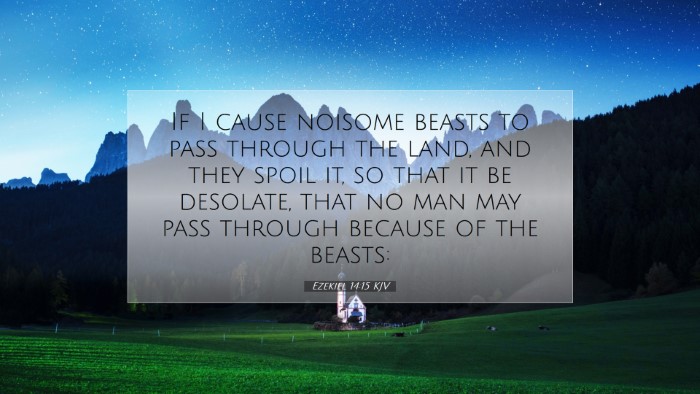Ezekiel 14:15 Commentary
Verse: Ezekiel 14:15 - "If I cause noisome beasts to pass through the land, and they spoil it, so that it be desolate, that no man may pass through because of the beasts."
This verse falls within a section of Ezekiel where God warns the people of Israel about the impending judgment due to their iniquities. Here, the imagery of "noisome beasts" is metaphorical for destructive forces that God may unleash as a consequence of sin.
Textual Analysis
Matthew Henry's Commentary: Henry interprets the 'noisome beasts' as a symbol of calamities and afflictions that might overtake the land if the people do not repent. He conveys that such judgments serve as both a warning and a means God uses to bring His people back to a covenant relationship with Him.
Albert Barnes' Notes: Barnes explores the notion that these beasts represent actual physical threats to Israel's existence. He emphasizes that the unrepentant state of the people will lead to desolation, reflecting God's sovereign control over creation and His ability to use natural occurrences to enact judgment.
Adam Clarke's Commentary: Clarke focuses on the broader implications of this verse, suggesting that spiritual desolation often follows national sins. He remarks that the desolate land represents not only physical destruction but also a spiritual barrenness that stems from turning away from God's commandments.
Theological Implications
These interpretations point to a significant theological theme in Ezekiel: the relationship between human behavior and divine judgment. Pastors and theologians can extract deep lessons here regarding the seriousness of sin and its consequences. The text emphasizes that God's judgments are both just and aimed at leading the sinner toward repentance and restoration.
Henry’s view illustrates God's use of afflictive providences as a means to warn His people. This aligns with the principle that God desires repentance over destruction (Ezekiel 33:11). Barnes elaborates on this by noting that the warning of destruction serves to urge the faithful to remain steadfast in their pursuit of righteousness, thereby potentially averting calamity.
Conversely, Clarke's assessment aligns with the idea of national responsibility for sin. He suggests that collective sins can lead to national devastation, which bears relevance today as societies grapple with moral decline. This narrative serves as a reminder that God’s judgment can manifest through various mediums, including environmental and animal life.
Practical Applications
- Call to Repentance: This verse serves as a reminder for both individuals and communities to turn away from destructive behaviors that lead to judgment.
- Awareness of Consequences: Pastors can use this passage to teach that even minor sins can lead to larger consequences if left unaddressed.
- Recognition of Divine Sovereignty: The acknowledgment that God rules over all aspects of creation encourages believers to submit to His will and guidance.
- Hope Amid Judgment: Even in pronouncements of judgment, there remains a glimmer of hope for restoration through repentance, an essential theme that can inspire a message of grace.
Conclusion
In summary, Ezekiel 14:15 serves as a powerful reminder of the destructive consequences of sin and the urgent need for repentance. Drawing insights from the commentaries of Henry, Barnes, and Clarke, we observe a consistent theme: God desires His people to return to Him, acknowledging their sins and seeking His forgiveness.
This passage can be instrumental in preaching and teaching contexts, offering valuable lessons on accountability, divine justice, and the profound mercy that God extends towards those who turn back to Him. Pastors, students, and theologians alike are encouraged to reflect on these insights as they engage with the text and its implications for faith and practice today.


